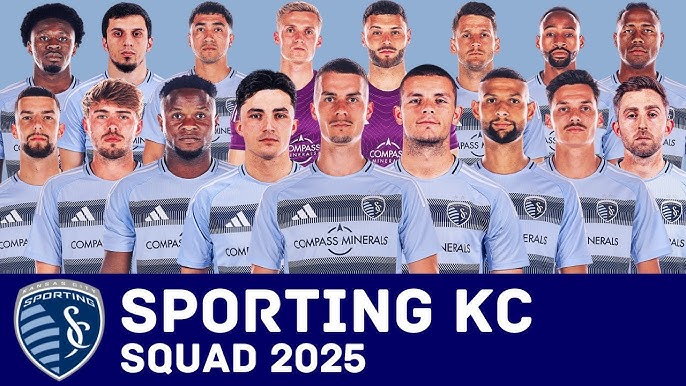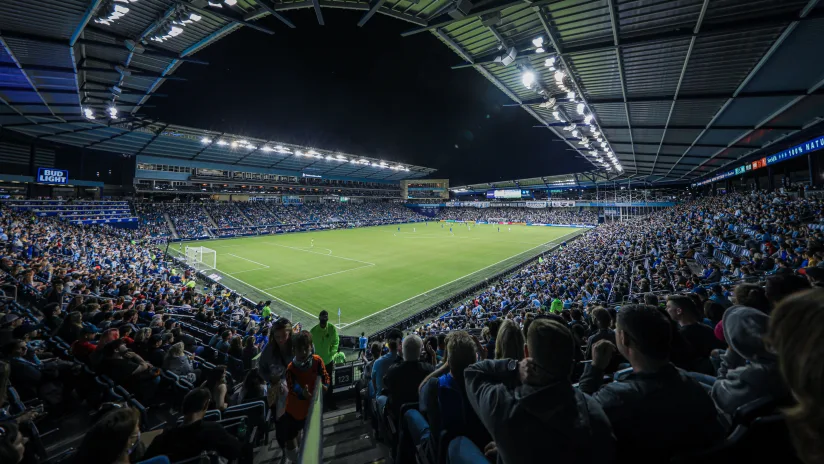MLS
Sporting Kansas City: The Heartland’s Soccer Standard-Bearer

Sporting Kansas City: The Heartland’s Soccer Standard-Bearer
Sporting Kansas City, widely known as SKC, is one of Major League Soccer’s most respected and pioneering clubs. Established in 1995 as the Kansas City Wiz, the franchise entered MLS during the league’s inaugural 1996 season. Over the decades, the club has undergone significant transformations in branding, stadium development, and competitive identity, evolving from a modest midwestern team into one of the most consistent and ambitious organizations in American soccer.
The club’s early years were defined by experimentation and identity building. Originally called the Kansas City Wiz, the team quickly rebranded as the Kansas City Wizards in 1997, a move that aligned more closely with the city’s culture and fan base. Success came relatively early, as the Wizards won the MLS Cup in 2000 under the guidance of coach Bob Gansler. That championship marked a turning point, showing that a small-market team in the Midwest could compete with clubs from larger, more internationally renowned markets.
In 2011, the franchise rebranded once again, this time as Sporting Kansas City. The name change symbolized a broader vision, moving away from traditional American-style team naming conventions toward a more global soccer identity. Along with the rebrand came a new crest, new colors of sporting blue and dark indigo, and a renewed commitment to becoming one of MLS’s model franchises both on and off the pitch.
This period of transformation coincided with the opening of Children’s Mercy Park, a soccer-specific stadium that quickly became a fortress for the team and a gathering point for fans across Kansas and Missouri. The rebrand and new stadium reenergized the fan base, leading to one of the most passionate and loyal followings in MLS.
Throughout its history, Sporting Kansas City has been defined by resilience, community, and a commitment to excellence. With multiple trophies, including two MLS Cups (2000, 2013) and several U.S. Open Cups, SKC has firmly established itself as a powerhouse in American soccer.
Trivia: SKC’s 2013 MLS Cup victory was one of the most dramatic in league history, decided by a penalty shootout against Real Salt Lake in freezing temperatures, with goalkeeper Jimmy Nielsen lifting the trophy in his final professional match.
Sporting Kansas City: Rivalries
Rivalries are essential to Sporting Kansas City’s identity, fueling fan passion and defining the club’s competitive spirit.
The most intense and historic rivalry is with Real Salt Lake, often referred to as the “I-70/I-80 Rivalry” due to the geographic connection across the Midwest and Mountain West. This rivalry reached its peak in the 2013 MLS Cup final, where SKC defeated RSL in dramatic fashion. The match solidified the animosity between the two clubs, and subsequent meetings have carried an edge, with physical play, dramatic finishes, and passionate fan involvement.
Another significant rivalry exists with the Houston Dynamo, dating back to the mid-2000s. The two clubs clashed repeatedly in the MLS Cup Playoffs, with Houston often serving as a stumbling block for Kansas City during that period. However, SKC eventually turned the tide, defeating Houston in key playoff series during their rise to prominence. The rivalry is marked by high-stakes matches and contrasting styles of play, making it one of the league’s underrated but fiercely contested rivalries.
SKC also has a regional rivalry with FC Dallas, driven by geographic proximity within the central United States. Matches between the two often feature large traveling contingents of supporters, adding intensity to the atmosphere. Dallas and SKC have both emphasized youth development and academy integration, creating an additional competitive layer as homegrown talents face off on the professional stage.
Additionally, rivalries with teams such as the Seattle Sounders, Portland Timbers, and LA Galaxy have grown due to playoff encounters and frequent battles for trophies. These rivalries highlight SKC’s stature as a perennial contender and ensure that matches against top Western Conference opponents carry significant weight.
Trivia: The rivalry with Real Salt Lake has featured some of the longest matches in MLS history, including the 2013 MLS Cup final that lasted 120 minutes plus a penalty shootout, played in sub-zero windchill temperatures.
Sporting Kansas City: Ownership
Sporting Kansas City’s ownership has been central to its transformation into one of MLS’s model franchises. The club is owned by Sporting Club, a consortium led by Cliff Illig, a Kansas City entrepreneur, and several other local investors. The group took over the franchise in 2006, rescuing it from a period of uncertainty and committing to keeping the team in Kansas City.
The new ownership invested heavily in infrastructure, most notably the construction of Children’s Mercy Park, which opened in 2011. This stadium not only gave the club a permanent home but also symbolized the new era of ambition and community integration. Ownership also rebranded the team as Sporting Kansas City, a decision that redefined its identity and positioned it as a forward-looking, globally inspired club.
Beyond infrastructure, Sporting Club has emphasized building a sustainable and competitive soccer organization. Investments in youth development, analytics, and sports science have ensured that SKC remains competitive while fostering long-term success. The ownership group is also deeply committed to community initiatives, making the club a central pillar of Kansas City culture.
Trivia: Sporting Club’s rebrand was influenced by European club models, where teams operate as multi-sport organizations. The name “Sporting” reflects this philosophy, even though soccer remains the core focus of the Kansas City franchise.

Watch Sporting Kansas City
Children’s Mercy Park, SKC’s home since 2011, is widely regarded as one of the finest soccer-specific stadiums in the United States. With a capacity of approximately 18,500, the stadium is designed to maximize fan engagement and create one of the most intimidating atmospheres in MLS. Its steep seating angles, roof canopy, and supporter-focused architecture ensure that noise is amplified, making it a fortress for the home team.
Located in Kansas City, Kansas, the stadium has become a community hub, hosting not only MLS matches but also U.S. Men’s and Women’s National Team games, CONCACAF Gold Cup matches, and other major soccer events. Its design has received international acclaim, serving as a model for other MLS clubs building soccer-specific venues.
The Cauldron, SKC’s supporters’ section, sits behind one of the goals and is renowned for its passion, tifo displays, and nonstop chanting. The Cauldron has been central to creating the vibrant matchday atmosphere that defines Children’s Mercy Park. Other supporter groups, such as South Stand SC and the KC Cauldron Ladies, also contribute to the culture.
The stadium features state-of-the-art amenities, including premium seating, training facilities, and community event spaces. Its design balances modernity with intimacy, ensuring fans feel close to the action.
Trivia: Children’s Mercy Park was the first stadium in the world to host a World Cup qualifier, an MLS Cup final, and the MLS All-Star Game, highlighting its versatility and global recognition.
Sporting Kansas City: This Season
The 2025 MLS season finds Sporting Kansas City striving to return to the upper echelon of the Western Conference. After experiencing ups and downs in recent years, the team has focused on rebuilding with a mix of experienced veterans and emerging homegrown talent.
Head coach Peter Vermes, the longest-serving coach in MLS history, continues to lead the team. Vermes is not only a tactical innovator but also a symbol of stability, having overseen SKC’s transformation over more than a decade. His emphasis on high-pressing, possession-based soccer has defined the club’s identity, and he remains committed to adapting his system to evolving league trends.
Key players in the 2025 season include a dynamic midfield core anchored by experienced leaders and promising young prospects. The attack features versatile forwards capable of both creating and finishing chances, while the defense, bolstered by academy graduates, focuses on maintaining discipline and composure. Injuries and squad rotation present ongoing challenges, but SKC’s depth ensures resilience across the long season.
Fans are particularly focused on the club’s performance in rivalry matches, especially against Real Salt Lake and Houston Dynamo. Playoff contention remains the primary goal, with the team aiming to return to consistent postseason success and challenge for silverware.
Trivia: Peter Vermes is the only individual in MLS history to win the MLS Cup as both a player and a coach with the same team, further cementing his legacy as synonymous with Sporting Kansas City.
Sporting Kansas City: What to Follow
Several storylines define Sporting Kansas City’s trajectory in 2025 and beyond.
First, the continued development of the academy system is critical. SKC was one of the first MLS clubs to invest heavily in youth development, and its pipeline has produced several standout players who have gone on to succeed in MLS and abroad. Maintaining this pipeline ensures sustainability and strengthens the first team with homegrown talent.
Second, the club’s supporter culture remains one of its defining features. The Cauldron and other groups ensure that every home match is a unique spectacle, filled with coordinated chants, tifo displays, and an unwavering commitment to the team. Fan culture will continue to shape the club’s identity as it grows nationally and internationally.
Third, competitive ambitions remain high. SKC aims to secure regular playoff appearances, contend for the MLS Cup, and maintain dominance in its rivalries. Achieving this requires balancing tactical evolution with squad stability, ensuring that the club adapts to new challenges while preserving its core identity.
Finally, community integration will remain central. The club has long prided itself on being more than just a soccer team, emphasizing local initiatives, charitable programs, and youth outreach. This commitment ensures that SKC is not only a sports franchise but also a pillar of the Kansas City community.
Trivia: SKC’s rebrand in 2011 was one of the most successful in American sports, transforming the club from a struggling franchise into a model organization admired across MLS and internationally.
